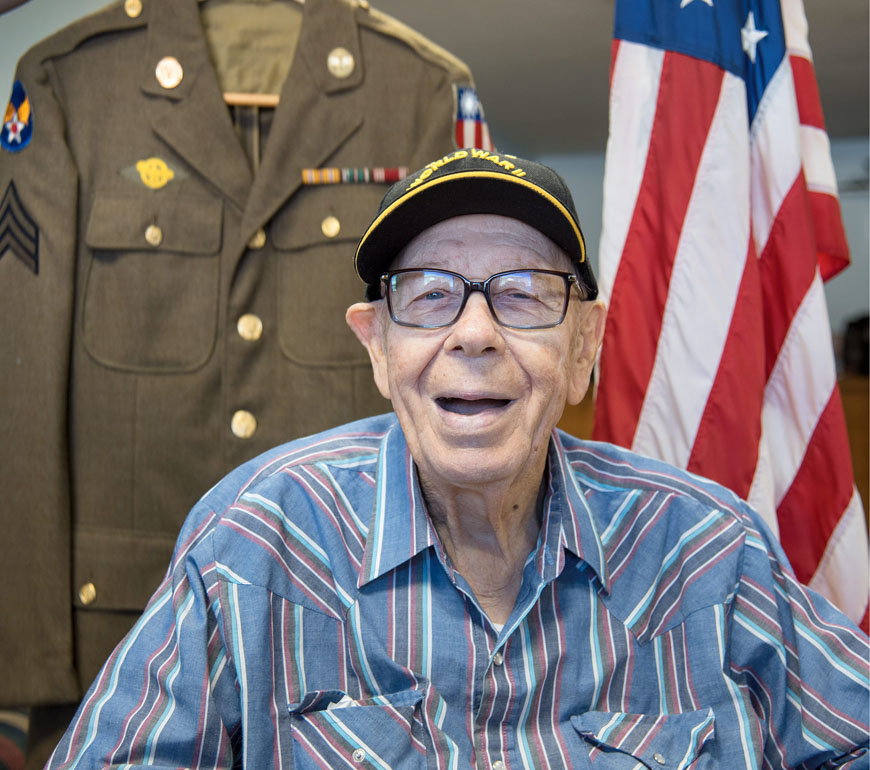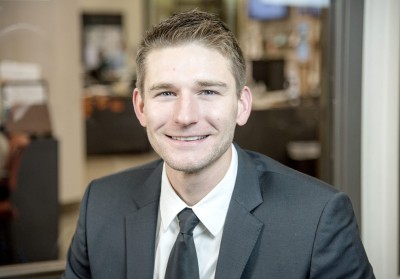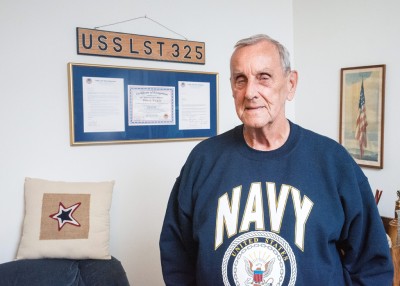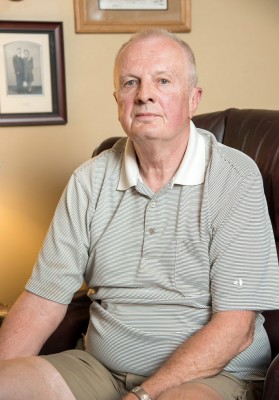Robert Weaver
By Paul Wood

Photo By Rick Danzl/The News-Gazette
Between bouts learning at and then teaching at Chanute Field in Rantoul, Robert Weaver served in World War II in North Africa and India, earning enough war-theater points to muster out and hear about the end of the conflict in Japan en route home.
As an expert airplane mechanic, Weaver, 95, was needed in the Atlantic and Pacific theaters.
In Tunisia, as planes fought above him, he and his buddies had to duck for cover from falling aircraft flak, resorting to trying to build shelters from bales of hay — and leaving their feet hanging out, as least unpleasant to lose.
The 30-year St. Joseph postmaster served as a sergeant in the 14th Army Air Force, keeping P-47 Thunderbolts flying so they could protect convoys.
As the Depression was coming to an end, Weaver was working on plumbing in his house. He was at the St. Joseph Oil Co. — which many remember as a Texaco — buying fittings when the radio broadcast news that Pearl Harbor had been attacked.
Weaver hadn’t know where it was, but soon became an expert.
“Everybody knew that we were in the war for the duration, and that was it,” he says.
He drove to Chanute Field, later Chanute Air Force Base, to enlist, and was sworn in Jan. 8, 1942, almost exactly a month after the attack.
Weaver trained in California at what is now Edwards Air Force Base and remembers hitchhiking and getting rides to Beverly Hills when everyone was doing any favor they could for a soldier.
Years later, he came back and saw how tall the palm trees had grown.
Weaver expected to head to London, where so many pilots and their planes were going, but after further training, he was put on a ship bound for North Africa.
His ship was a small part of a big invasion, expected to land at Port Lyautey in Morocco.
Operation Torch was a large Allied landing to seize control of North Africa from Germany. This would be the first time U.S. troops faced the Germans in combat in World War II.
In November 1942, the port was officially French, and Weaver says his superiors did not expect much resistance from the French.
Early on a Sunday morning, he recalls, small landing boats left the ships about a mile out.
“We were standing at the side looking over,” he recalled in a memoir, “and we began to see a splash here and a splash there. At first we didn’t know what it was, but then realized the French were shelling us.”
The ship pulled back, and Navy fighter planes joined with cruisers to counter-attack.
It was another night before he was able to land and to get to an airport where he was supposed to fix airplanes — only to find out the runways had been shot up so planes could not land.
Later, he came within 45 miles of a famous battle, the Kasserine Pass.
“In the early morning hours of Feb. 19, (1943,) the Germans activated their attack through the Kasserine Pass, inflicting heavy damage on the Allied forces in the coming days as the Allies reeled westward in retreat for 50 miles,” is how the National World War II museum describes its beginnings.
The battle helped make the reputation of Gen. George S. Patton, and the experience of it led to reforms in the U.S. military.
Weaver worked all over the Mediterranean, wherever an expert mechanic was needed. He repaired and replaced airplane engines ruined by sand, among other things.
With North Africa under control, he was sent to India in 1944. He had a stay in Karachi, now part of Pakistan, and near Calcutta, getting new planes into tip-top condition.
After the war, he went to college at the University of Illinois, majoring in mechanical engineering, but not finishing the course because he had been out of school so long.
Still, he easily found work with his mechanical skills.
Drawn back to St. Joseph, he spent decades as its postmaster. He married Berneice, who predeceased him.
They had one son, Chuck, who helped his father with this interview and provided bookfuls of photos, articles and souvenirs.
Do you know a veteran who could share a story about military service? Contact staff writer Paul Wood at pwood@news-gazette.com.
Read more stories from local veterans:
 Ben Thompson
CHAMPAIGN — Wounded by a Taliban-trained fighter, Sgt. Ben Thompson finished his patrol, then was back in the fight two …
Ben Thompson
CHAMPAIGN — Wounded by a Taliban-trained fighter, Sgt. Ben Thompson finished his patrol, then was back in the fight two …
 Bruce Voges
ST. JOSEPH — Bruce Voges enlisted in the Navy in 1944 at the age of 17, landed Marines from a small craft on Iwo Jima an …
Bruce Voges
ST. JOSEPH — Bruce Voges enlisted in the Navy in 1944 at the age of 17, landed Marines from a small craft on Iwo Jima an …
 Gary Volkening
MAHOMET — In Vietnam, a sniper bullet passed through Gary Volkening’s wallet while he was sleeping in a hooch. “This is …
Gary Volkening
MAHOMET — In Vietnam, a sniper bullet passed through Gary Volkening’s wallet while he was sleeping in a hooch. “This is …